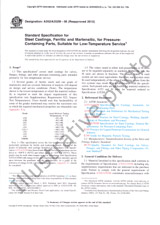We need your consent to use the individual data so that you can see information about your interests, among other things. Click "OK" to give your consent.
ASTM D2067-97(2020)
Standard Test Method for Coarse Particles in Printing Ink Dispersions
Translate name
STANDARD published on 1.6.2020
The information about the standard:
Designation standards: ASTM D2067-97(2020)
Publication date standards: 1.6.2020
SKU: NS-997568
The number of pages: 3
Approximate weight : 9 g (0.02 lbs)
Country: American technical standard
Category: Technical standards ASTM
The category - similar standards:
Annotation of standard text ASTM D2067-97(2020) :
Keywords:
coarse particles, dispersions, pigment dispersions, printing inks, wire-cloth sieve,, ICS Number Code 87.080 (Inks. Printing inks)
Additional information
| Significance and Use | ||||||||||||
|
4.1 Coarse particles in printing inks reduce the efficiency of the dispersion process, requiring not only extra milling passes, but also frequent changes in pump filters. In printing processes, they may cause excessive wear to metal plates, piling or localized retention of ink on blankets and plates, and water balance problems. Coarse particles also reduce color strength and the gloss of printed matter. 4.2 This test method is suitable for quality control. The precision may be improved by the use of a specimen size larger than that prescribed. 4.3 Test results are sensitive to the type of washout solvent used. Strong solvents are to be avoided because they may dissolve large particles of resin in the ink vehicle. |
||||||||||||
| 1. Scope | ||||||||||||
|
1.1 This test method covers the determination of the weight concentration of coarse particles in printing ink dispersions by sieve retention. 1.2 This test method is applicable to printing inks, flushed pigments, and other pigment dispersions that contain particles larger than 45 μm. With proper choice of solvent, it is applicable both to paste and liquid inks. Note 1: This test method is similar in principle to Test
Methods D185. For particles
under 25 μm, see Test Method D1316.
1.3 The values stated in SI units are to be regarded as the standard. The values given in parentheses are for information only. 1.4 This standard does not purport to address all of the safety concerns, if any, associated with its use. It is the responsibility of the user of this standard to establish appropriate safety, health, and environmental practices and determine the applicability of regulatory limitations prior to use. 1.5 This international standard was developed in accordance with internationally recognized principles on standardization established in the Decision on Principles for the Development of International Standards, Guides and Recommendations issued by the World Trade Organization Technical Barriers to Trade (TBT) Committee. |
||||||||||||
| 2. Referenced Documents | ||||||||||||
|
We recommend:
Technical standards updating
Do you want to make sure you use only the valid technical standards?
We can offer you a solution which will provide you a monthly overview concerning the updating of standards which you use.
Would you like to know more? Look at this page.




 Cookies
Cookies
